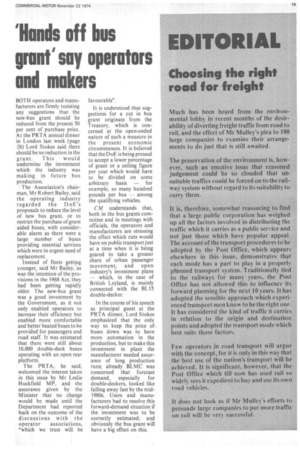'Hands off bus grant' soy operators and makers
Page 21

If you've noticed an error in this article please click here to report it so we can fix it.
BOTH operators and manufacturers are firmly resisting any suggestions that the new-bus grant should be reduced from the present 50 per cent of purchase price. At the PRTA annual dinner in London last week (page ,26) Lord Stokes said there should be no reduction in the grant. This would undermine the investment which the industry was making in future bus production.
The Association's chairman, Mr Robert Bailey, said the operating industry regarded the DoE's proposals to reduce the level of new bus grant, or to restrict the purchase of grant aided buses, with considerable alarm as there were a large number of buses providing essential services which were in urgent need of replacement.
Instead of fleets getting younger, said Mr Bailey, as was the intention of the provisions in the 1968 Act, they had been getting rapidly older. The new-bus grant was a good investment by the Government, as it not only enabled operators to increase their efficiency but enabled more comfortable and better heated buses to be provided for passengers and road staff. It was estimated that there were still about 10,000 double-deck buses operating with an open rear platform.
The PRTA, he said, welcomed the interest taken in this issue by Mr Leslie 14 uckfield MP, and the assurance given by the Minister that no change would be made until the Department had reported back on the outcome of the discussions with the operator associations, "which we trust will be favourable".
It is understood that suggestions for a cut in bus grant originate from the Treasury, which is concerned at the open-ended nature of such a measure in the present economic circumstances. It is believed that the DoE is being pressed to accept a lower percentage of grant or a ceiling figure per year which would have to be divided on some arbitrary basis — for example, so many hundred pounds per bus — among the qualifying vehicles.
CM understands that, both in the bus grants committee and in meetings with officials, the operators and manufacturers are stressing the effect which cuts would have on public transportjust at a time when it is being geared to take a greater share of urban passenger movement, and upon industry's investment plans — which, in the case of British Leyland, is mainly connected with the BL15 double-decker.
In the course of his speech as principal guest at the PRTA dinner, Lord Stokes emphasized that the only way to keep the price of buses down was to have more automation in the production, but to make this investment in plant the manufacturer needed assurance of long production runs; already BLMC was concerned that forecast demand, especially for double-deckers, looked like falling away fast by the mid1980s. Users and manufacturers had to resolve this forward-demand situation if the investment was to be correctly estimated; and obviously the bus grant will have a big effect on this.




















































































































